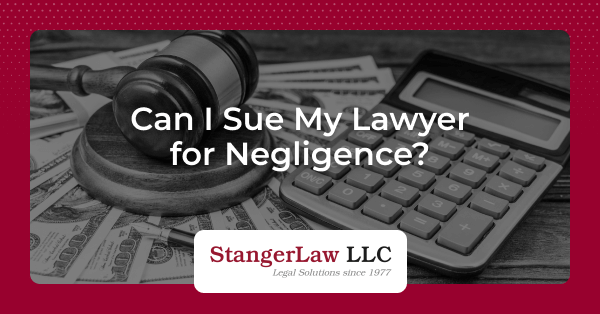Can I Sue My Lawyer for Negligence?
Like all professionals, lawyers owe their clients a duty of care.
Lawyers may make mistakes from time to time. A claim of malpractice may exist if your lawyer exhibited negligence in your representation.
If your lawyer’s negligence caused you to suffer harm or a less advantageous outcome or settlement in your case, you may have a claim to sue your lawyer for professional negligence.
Establishing a legal malpractice claim for a negligent lawyer is complex and varies from case to case.
Our Practice is Limited to Connecticut
We handle Connecticut legal malpractice claims. We won’t review cases where financial losses are less than $100,000.
Consider the following questions before contacting a Connecticut legal malpractice lawyer.
What Is The Established Standard of Care?
Lawyers are not required to be perfect or even win your case. However, lawyers must use the same care, skill, and diligence possessed by other lawyers in their community under similar circumstances. (See, Connecticut Practice Book, Rules of Professional Conduct). A negligent lawyer fails to uphold this requirement, resulting in a less favorable result for their client.
When a negligent lawyer falls below this standard of care, they have committed legal malpractice.
The American Bar Association (ABA) Standing Committee on Ethics and Professional Responsibility dictates guidelines on attorney responsibility regarding client representation.
Similarly, the Connecticut Practice Book provides rules that Connecticut Lawyers must follow.
The Connecticut Rule 1.4 of Professional Responsibility “Communication” provides that attorneys must undertake the following regarding communication with clients:
- Inform clients of a decision requiring the client’s informed consent;
- Inform clients of how the attorney plans to achieve client objectives in their case;
- Keep clients reasonably informed about their case;
- Promptly comply with reasonable requests for information
- Consult with the client about limitations on the lawyer’s conduct when the client expects assistance not permitted by the Rules of Professional Conduct or other laws.
- A lawyer shall explain matters so clients can make informed decisions regarding their representation
Many circumstances surrounding a legal malpractice claim may be centered around Rule 1.4 of the Connecticut Rules of Professional Conduct.
A lawyer is expected to let the client know the various steps the lawyer is taking to best represent their client. As the client is not only paying their attorney, but putting their fate in them, it is important for a lawyer to be thorough.
What are Some Examples of Legal Malpractice?
Malpractice cases are very fact specific and depend on the specific circumstances of your case.
An attorney’s decision must be analyzed at the time it was made. Rarely are decisions made with the benefit of hindsight. A lot depends on what the lawyer knew or should have known.
However, we tend to see common mistakes that lawyers make over and over, including:
- Inaccurate billing;
- Missed deadlines;
- Failing to communicate with the client;
- Lying to the client;
- Settling a lawsuit without the client’s consent;
- Giving inaccurate legal advice;
- Stealing or losing money or property that belongs to the client;
- Not showing up to court;
- Failing to disclose an expert witness;
- Incompetently drafting legal documents that do not protect your rights;
- Failing to file a case before the expiration of the statute of limitations; and
- Taking a case despite an existing conflict of interest.
A basis for suing a lawyer for professional negligence may exist if these or other mistakes were made.
What Is an Attorney’s Duty to Self-Report?
Clients may find it surprising that attorneys have a duty to self-report in certain circumstances.
For example, the Connecticut Rules of Professional Conduct has interpreted Rule 1.4 as imposing an OBLIGATION on an attorney to notify a client when the client may have a legal malpractice claim against the attorney. This obligation exists even if the notification goes against the attorney’s own interest.
Additionally, the Connecticut Rules of Professional Conduct similar to Model Rule 1.7 focuses on conflict of interest and self-reporting duties of an attorney. Here, Connecticut Rules of Professional Conduct Rule 1.7 obligates an attorney to notify a client if the representation will be limited by a personal interest of the lawyer. When an attorney fails to self-report these matters to you, there lies evidence of an intentional effort by the attorney to conceal the issues.
Therefore, an attorney’s failure to self-report may give rise to an additional malpractice claim.
Have I Suffered an Injury?
In order to have a successful legal malpractice case, it is not enough to say your lawyer screwed up. Additionally, you must have suffered damages.
Typically, injured clients suffer financial losses as a result of legal malpractice.
For example, your lawyer might have missed a deadline in your car accident case, leading to your case being dismissed. Had the lawyer properly filed your paperwork, you would have been able to pursue compensation for the injuries you suffered in the collision. In a legal malpractice lawsuit, you can ask for the compensation you would have received but for your lawyer’s professional negligence.
Realize that the courts do not entertain legal malpractice cases just to tell lawyers they are bad at their jobs. However, you can always file a complaint with the state’s grievance committee if you think your lawyer is unethical.
If you think your lawyer has committed a crime, you can also call the police to investigate.
What Do I Have to Prove?
Establishing a claim of legal malpractice is complex and varies from case to case. The following criteria establish a negligence claim.
Duty
The existence of an attorney-client relationship establishes a duty of care.
Typically, a verbal or written agreement between the parties exhibits an attorney-client relationship. A duty of care requires an attorney to use the same care, skill, and diligence possessed by other lawyers in their community under similar circumstances. Suing a lawyer for professional negligence may require expert witnesses to determine what standard of care existed in your particular case.
Breach
A breach occurs when a lawyer fails to exercise reasonable care in your representation.
For example, if the standard of care includes filing pleadings on time and your attorney misses an important deadline, they will have breached the standard of care.
Causation
Proving that, but for the attorney’s negligence, you would have obtained a more favorable settlement or outcome establishes causation. In other words, the harm you suffer must follow directly from the attorney’s negligence.
A lawyer is not required to win your case, so the fact that you lost is not enough to establish causation. If evidence suggests that you were likely to lose your case even without the attorney’s breach, that may substantially weaken your malpractice claim.
Damages
Damages in a negligence malpractice claim are quantified by what was recovered and what would have been recovered but for the attorney’s negligence.
A typical example of negligence occurs when an attorney fails to file a case before the statute of limitations expires. Missing the deadline bars the client from filing a claim. In their malpractice claim, the client must prove that they would have won their case if it was filed on time. Proof of the amount they would have won in the case and a collectible judgment is required.
What Evidence Should I Collect?
Before pursuing a legal malpractice case, pull together all relevant documents and information.
Collect communications between you and your lawyer as well as information about the case that led you to hire the attorney in the first place.
For example, if you hired a lawyer to draft a marital separation agreement, find your copy of the agreement. Additionally, your lawyer is required to maintain a copy of your entire file, and give you notice before they destroy it. If you have a legal malpractice case you should obtain your file or hire an attorney who will obtain it for you.
Your Lawyer Must Follow the Rules of Professional Conduct
The lawyer’s role is to defend and advocate for you and protect your rights.
Sadly, sometimes this does not happen. Lawyers must follow the Connecticut Rules of Professional Responsibility. If they violate those rules, the rules may be evidence in court of the negligence of the lawyers.
In some situations, you can file a grievance but the grievance does not get the client compensation for their financial losses. Unfortunately some people don’t realize that, and they wait to contact us until after filing the grievance and sometimes even after a decision on the grievance.
Valuable time is wasted if we are not contacted early. There are time limits for filing claims against lawyers. The failure to have us bring a claim on time can result in losing any and all rights. The delay may also cause us to decline to get involved.
Our clients’ goal is typically to get compensation for whatever the lawyer screwed up.
StangerLaw LLC can help you understand your rights and take the lead in filing a lawsuit against an attorney when needed.
Speak with a Legal Malpractice Lawyer in Hartford, Connecticut
Legal malpractice cases are complicated. There are not many legal malpractice lawyers, and if they do, very few have the experience of our firm.
If you suspect that your lawyer has made a mistake that has harmed you, you may have a legal malpractice case.
The dedicated attorneys at StangerLaw LLC understand how devastating it can be when a negligent attorney fails to provide you with the level of care you deserve. Our firm is dedicated to preserving your rights and upholding the standard of care expected in the legal profession.
Contact us online or call (860) 561-0651 today to determine if you have a valid legal malpractice claim against your former attorney.

